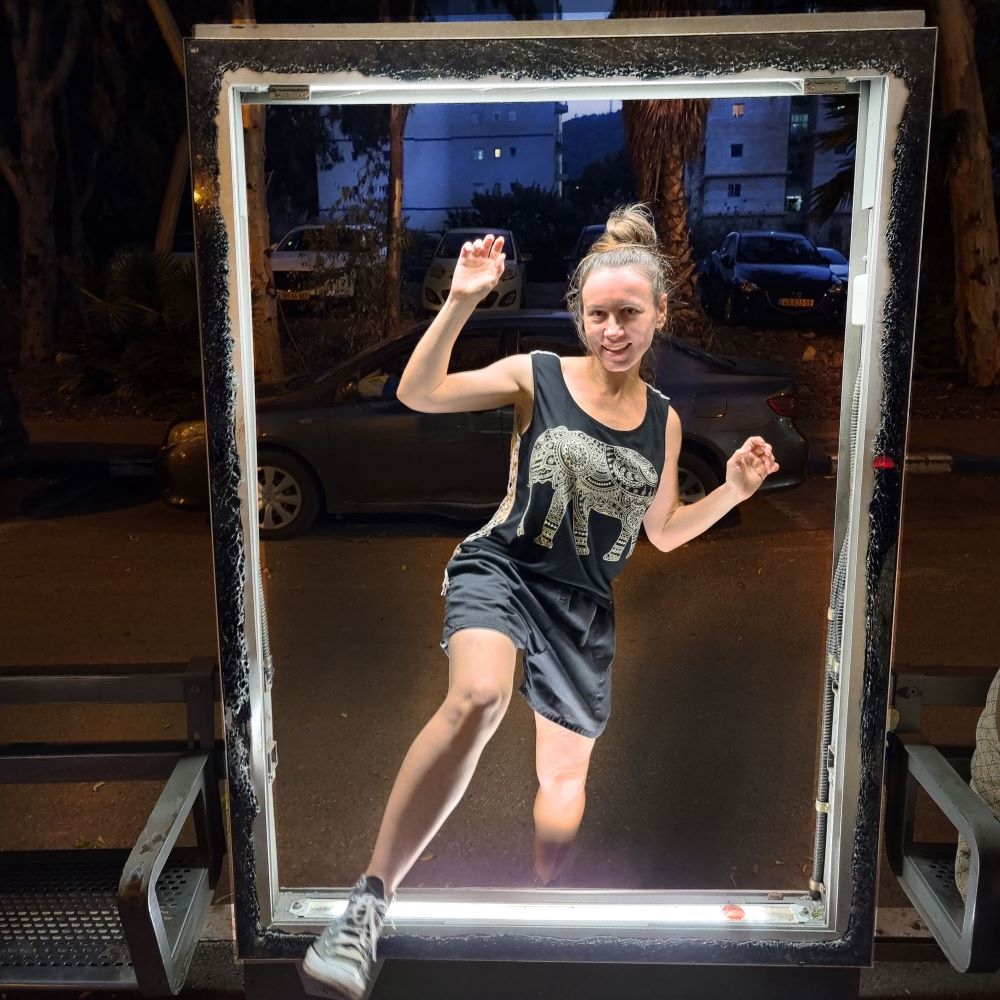You can spend years thinking about how you’re going to do something. And sometimes life kicks you in the butt and you fly into a new reality through a bus stop window. And it’s not at all what you imagined. I had no idea that in Israel I would be living on a mountain in a pine forest overlooking a snowy peak. That I would eat hummus less often in Israel than in Moscow. And that most of the fall, winter, and spring I would wear warm socks and a scarf, and complain at home, “Why is it so cold! Israel is a hot country, they call it…”

They say that Israel is a difficult country to live in, you have to work hard, suffer because of the hot weather and high prices. Many people told me that it was scary, that I would go broke, and that Israel would not work for me. I wanted to check everything myself. And on the spot to see what it’s like here. And I, of course, was very surprised. All my ideas about Israel turned out to be naive and far from reality.
About life in Israel
What features of Israeli culture made the greatest impression on you compared to Russian culture?
In Israel it is considered normal to think of oneself and behave in a way that is not too polite. On the other hand, in Israel, people are very fond of helping new repatriates and immigrants, getting involved and not being indifferent, giving advice, sharing things and experiences. Yes, old things and products (especially bread) in good condition are taken out en masse to the trash, so it’s hard to stay hungry and cold in Israel.
What Israeli dishes have you been able to try since you arrived and which of them did you like best?
I’ve tried falafel in many cities – it’s the local vegetarian shawarma, very tasty, especially if you add more tehina and hummus. And different kinds of shawarma with meat and vegetable salad, which is commonly called “Israeli salad” here. There are very tasty sweets and dried fruits. I was most impressed with the frozen vegetable soup – spicy, dense, flavorful. And it’s quick to make, just defrost in the microwave and that’s it.
What was the most difficult aspect of adapting to the Israeli way of life for you?
The hardest part for me was finding the motivation to learn Hebrew, since all the applications and bureaucracy are mostly in the local language, it makes a lot of everyday things difficult. Russian and English help a little. But Hebrew is desirable to know in order to solve everyday issues. Very lazy to learn the language and difficult to motivate yourself.
The second point is the human factor. Local slovenliness and sluggishness. Personal connections. You come for the documents, and there is no one in a hurry, they can discuss family matters. Can throw a letter into someone else’s mailbox. When I thought that in Russia everything was on personal level, I just hadn’t lived in Israel yet – everyone knows someone here, everyone has some friends who help them in one way or another.
What do you think are the key differences between the Moscow and Israeli mentality?
In Moscow, people are usually less emotional, mind their own business and their own lives. At the same time, the service is usually more formal, and the staff are more polite. In Israel, people are loud and talk to each other at the bus stop, in transport, neighbors talk to each other. And in some places, the service is reminiscent of caricatured Soviet saleswomen who don’t even want to smile.
In Moscow, there is a feeling that you are on your own, no one cares about you. In Israel, there is the feeling of a big village, where everyone knows everything about everyone, discusses everything, and tries to help. Moscow is a more aloof and formal city, but in Israel you feel warm and caring, even if in some places without a nice smile.
Tell me about the most unusual encounter or situation that has happened to you since you arrived in Israel.
Once a female subscriber came up to me on the street and offered to feed me dinner. There was also an unusual moment when we rented the cheapest accommodation and it was a room in a huge villa for $3 million, and our roommates were two other MSU guys. It was a lot of fun to live there!
What local traditions or holidays have you already experienced and which have left the most vivid memories?
I arrived in Israel and immediately found myself at the Sukkot holiday, when they put up tents and feed guests. The guys who sheltered us also made their own tent on the balcony – it was very interesting. They are also orthodox Jews, so in the very first days I was immersed in Jewish traditional life. It was as if I was in an unusual ceremony – everyone sings and does different things in a coordinated manner, the bread is dipped in honey, then you can not speak, then you must read the prayers and repeat gestures.
I had a similar experience in Japan, when colleagues from the university invited us to a traditional ceremony. You sit there, all the time doing something wrong, but trying to repeat after the people around you, so that you too can be in this role with everyone else, learn something new. It was great that everything was explained to us in great detail and in terms of culture and religion.
If you were offered to create a joint project to bring the cultures of Russia and Israel closer together, what would it be?
Food. I love to eat, so it seems to me that the best joint project is a dish that contains different traditions. Let’s say falafel with herring under a fur coat, something so unusual. Or pancakes with caviar and tehina… You have to try and see what would taste good together. I think people from all over the world would love to come and try these multicultural dishes.
Do you think the Israeli education system is more or less suitable for you and your family compared to the Russian one? Why?
I was surprised that in Israel, people study until they are very old, take some courses, get retrained, get new professions. This is very cool, because a person in life can change fields several times – was an accountant, became a guide. It is normal here. Universities offer short and medium term programs for all tastes. And no one will be surprised if at 40-50 years of age you decide to completely change the occupation.
How would you describe your ideal day in Israel and what places would you like to visit?
Every day is pretty much perfect for me. I blog and do all sorts of creative, interesting things. I want to visit the caves, Mount Hermon and the parks, where there is a body of water and lots of greenery. There’s so much to see here that I don’t think I could cover it all in a lifetime!

